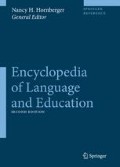References
Bialystok, E.: 1988, ‘Levels of bilingualism and levels of linguistic awareness’, Developmental Psychology 24, 560–567.
Bialystok, E.: 2001, Bilingualism in Development: Language, Literacy, and Cognition, Cambridge University Press, New York.
Bialystok, E., Craik, F., Klein, E., and Viswanathan, M.: 2004, ‘Bilingualism, aging and cognitive control: Evidence from the Simon task’, Psychology and Aging 19(2), 290–303.
Cenoz, J., Hufeisen, B., and Jessner, U.: 2001a, Cross‐linguistic Influence in Third Language Acquisition: Psycholinguistic Perspectives, Multilingual Matters, Clevedon.
Cenoz, J. and Jessner, U.: 2000, English in Europe: The Acquisition of a Third Language, Multilingual Matters, Clevedon.
Cenoz, J. and Valencia, J.F.: 1994, ‘Additive trilingualism: Evidence from the Basque Country’, Applied Psycholinguistics 15, 195–207.
Cenoz, J., Hufeisen, B., and Jessner, U.: 2001b, Looking Beyond Second Language Acquisition: Studies in Tri‐and Multilingualism, Stauffenburg, Tubingen.
Cummins, J.: 1981, ‘The role of primary language development in promoting educational success for language minority students’, in California State Department of Education (ed.), Schooling and Language Minority Students: A Theoretical Framework, Evaluation, Dissemination, and Assessment Center, California State University, Los Angeles, 3–49.
Dörnyei, Z.: 2002, ‘The motivational basis of language learning tasks’, in P. Robinson (ed.), Individual Differences and Instructed Language Learning, John Benjamins, Amsterdam, 137–158.
García Mayo, M.P. and García Lecumberri, M.L.: 2003, Age and the Acquisition of English as a Foreign Language, Multilingual Matters, Clevedon.
Kellerman, E.: 1983, ‘Now you see it, now you don't’, in S. Gass and L. Selinker (eds.), Language Transfer in Language Learning, Newbury House, Rowley, MA, 112–134.
Klein, E.: 1995, ‘Second versus third language acquisition: Is there a difference?’, Language Learning 45(3), 419–465.
Lambert, W.E.: 1981, ‘Bilingualism and language acquisition’, in H. Winitz (ed.), Native Language and Foreign Language Acquisition, The New York Academy of Sciences, New York, 9–22.
Masgoret, A.M. and Gardner, R.C.: 2003, ‘Attitudes, motivation, and second language learning: Meta‐analyses of studies by Gardner and associates’, Language Learning 53(1), 123–163.
McLaughlin, B. and Nayak, N.: 1989, ‘Processing a new language: Does knowing other languages make a difference?’, in H.W. Dechert and M. Raupach (eds.), Interlingual Processes, Gunter Narr, Tübingen, 5–16.
Nation, R. and McLaughlin, B.: 1986, ‘Novices and experts: An information processing approach to the “good language learner” problem’, Applied Psycholinguistics 7(1), 41–55.
Nayak, N., Hansen, N., Krueger, N., and McLaughlin, B.: 1990, ‘Language‐learning strategies in monolingual and multilingual adults’, Language Learning 40, 221–244.
Sanz, C.: 1997, ‘Issues in SLA research methodology: Production processes and variability’, in W.R. Glass and A.T. Pérez‐Lerroux (eds.), Current Approaches to L1 and L2 Acquisition of Spanish, Cascadilla Press, Cambridge, MA.
Sanz, C.: 2000, ‘Bilingual education enhances third language acquisition: Evidence from Catalonia’, Applied Psycholinguistics 21, 23–44.
Sanz, C.: 2005, July, ‘Type of Input, Bilingualism, and L3 Acquisition: A Computer‐based Study’, paper presented at the Association Internationale de Linguistique Appliquee (AILA), Madison, WI.
Sanz, C.: (forthcoming), ‘The role of bilingual literacy in the acquisition of a third language’, in C. Pérez Vidal, A. Bel, and M. Juan Garau (eds.), A Portrait of the Young in the New Multilingual Spain, Multilingual Matters.
Swain, M., Lapkin, S., Rowen, N., and Hart, D.: 1990, ‘The role of mother tongue literacy in third language learning’, Language, Culture and Curriculum 3(1), 65–81.
Wagner, D., Spratt, J., and Ezzaki, A.: 1989, ‘Does learning to read in a second language always put the child at a disadvantage? Some counterevidence from Morocco’, Applied Psycholinguistics 10, 31–48.
Author information
Authors and Affiliations
Editor information
Editors and Affiliations
Rights and permissions
Copyright information
© 2008 Springer Science+Business Media LLC
About this entry
Cite this entry
Sanz, C., Lado, B. (2008). Third Language Acquisition Research Methods. In: Hornberger, N.H. (eds) Encyclopedia of Language and Education. Springer, Boston, MA. https://doi.org/10.1007/978-0-387-30424-3_249
Download citation
DOI: https://doi.org/10.1007/978-0-387-30424-3_249
Publisher Name: Springer, Boston, MA
Print ISBN: 978-0-387-32875-1
Online ISBN: 978-0-387-30424-3
eBook Packages: Humanities, Social Sciences and Law

